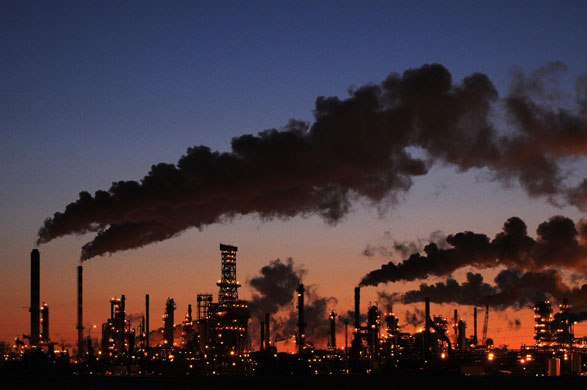Today I came across a photograph that could be a picture-perfect illustration of how aesthetic judgment depends on context. I also discovered a photograph that could be a picture-perfect illustration of how political judgment depends on context. Fortunately, the two photos are identical:
This photo of an oil refinery in Edmonton, Alberta could be placed on a Petro-Canada promotional brochure. Surely for many of those in the business, and for a majority of those in North America in the last half of the twentieth century, this could be an image of progress. The sun is setting but that doesn’t matter as hundreds of lights wink on at the refinery that is a vital node in the great industrial system that has all but eliminated darkness in the modern world. The plant (note the word) seems to be a substitute for nature itself: electric light replaces sunlight, the steam from the towers plumes like beautiful clouds across the night sky, and all this because subterranean power is being drawn out of the deep earth.
The stacks, towers, and other structures are the work of civilization, of course. The industrial complex seems to be a city rather than one factory for powering distant networks. This seamless fusion of the natural and technological sublime is one source of the photograph’s appeal. We are brought to a limit condition–the setting of the sun, the outer edge of civilization–and yet can gaze safely on the power emanating from the other side. Awesome power that is contained by the machinery of civilization, from refinery to camera.
But that is only half of the story. The same image will have looked quite different to those who saw high-volume pollution instead of billowing vapor, and consumption of a non-renewable resource instead of production, and a massed concentration of corporate power instead of economies of scale creating mass prosperity. Likewise, the design and tonal values of the image can reveal not beauty and power fused together but instead an allegory of the decline of the industrial society. Now the sun is setting on both the landscape and the refinery. The orange glow along the horizon reveals what was always true: that this was an infernal place that could only end in self-destruction. The lights now look like torches that cannot hold off the impending night when the oil runs out, never to be replaced for hundreds of millions of years. Instead of replacing nature, this place is returning to nature as sure as night follows day.
I’m writing this at night, the computer screen aglow in a house illuminated and heated by power plants that draw on resources thousands of miles away, day and night, year in and year out, continuously, reliably, without my doing anything other than writing a check once a month. That has to be acknowledged. The oil does no good to anyone if never used, but it would be one of history’s great crimes to exhaust the supply before a sustainable alternative was available. Likewise, it seems foolish to deny that the image can be a symbol of progress, but the wiser choice might be to see it as an allegory of decline.
Photograph by Dan Reidhuber/Reuters.

Discussion